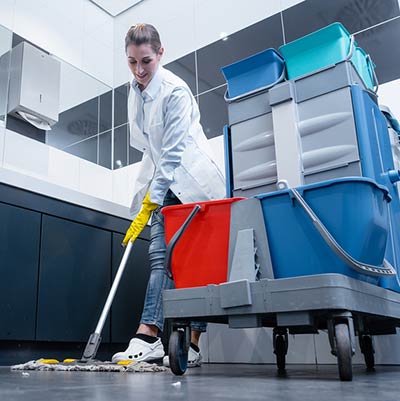Cleaners and cleaning staff can often claim a lot of tax deductions
If you’re in the cleaning business and you’re not making the most of these tax deductions for cleaners, then you might lose out on a heap of cash every year.
Whatever type of cleaner you are, we understand your job can be tough! Once you’ve handled “Mary-at-No.3” who’s a clean-freak, Dave-on-level-4’s inability to get anything near his mouth without dropping half of it around his desk, or marvelled at just how much make-up one woman can smear around a hotel bathroom – you’re done!
The last thing you want to do is think about tax. However, if you do think about it every now and then, and remember to take note of your work expenses throughout the year, you could well earn yourself back a nice little award at tax time.
Check out our Record Keeping blog to help make that easier – and read on to lean more about cleaners’ tax deductions.
Equipment costs = the bulk of tax deductions for cleaners
Equipment and tools are essential to do your job. You can generally claim the cost of purchase for vacuums, sprayers, polishers and more – they can all be listed as tax deductions for cleaners, as long as you paid for it yourself and it’s directly needed for your cleaning work.
The tools of your trade take a real beating so it’s good to know you can also claim the cost of maintaining and repairing equipment related to your cleaning work.
The costs of more disposable or fast turnover items like cloths, mops, buckets and dusters can all be added to your tax return as cleaner tax deductions in the tools and equipment section. And don’t forget carriers, boot dividers and other bits and pieces you use to make transporting your materials easier.
Examples of tax-deductible equipment “under $300”:
- Cleaning chemicals
- Wash/bathroom products
- Small cleaning machines
- Parts and accessories
- Garbage bags
- Cloths and wipes
- Sponges and scourers
- Dusters
- Scrapers and blades
- Applicators
- Dust and cleaning mops
- Buckets and wringers
- Brooms and brushware
- Trolleys and carriers
- Batteries
- Carpet cleaning accessories

You need to claim depreciation on items costing more than $300, unless you are running your own cleaning business.
With the current instant write off still available, small businesses can claim an immediate deduction for the business portion of the cost of an asset for the year the asset is first in use.
The instant asset threshold and eligibility have changed over time, so it is best to talk to your tax agent at Etax to help get this right!
- Vacuum cleaners
- Floor polishing machines
- Pressure washers
- Blowers
- Floor scrubbers
- Carpet cleaners
Uniforms and protective items
If you are required to wear a cleaning company uniform and use protective clothes or equipment, and you paid for the items, then you can include them as deductions on your tax return. You can also claim the cost of cleaning or repair to your protective clothes and uniform.
These can include:
- Compulsory uniforms
- Laundering and repair of uniforms
- Hats
- Hair nets
- Aprons/smocks
- Gloves
- Shoes
- Glasses
- Masks
- Sun protection
Note: You cannot claim for clothing that can be worn outside of work, such as plain black trousers or shirt.
Car expense tax deductions
Cleaners are the very few people who may be able to claim their car journey to and from work. Generally, this journey is not claimable. However, the exception is if you are required to transport heavy items to and from your place of work. If you need to do this and are unable to leave your equipment at work, you can include this journey on your car expenses at tax time.
You can also claim travel between sites or to meetings or to pick up supplies.
Be careful which method you choose to record your own car expenses. The simplest way may not be the most profitable. Your tax agent will advise you on which method is best for your particular circumstances.
The cents per kilometre method
What you need to know:
- The rate per kilometre you can claim changes per tax year, check the correct year rate here
- You can claim a maximum of 5000 kilometres in a single tax year
- You don’t need written evidence/receipts but you should be able to show how you reached that amount through a diary or schedule.
The logbook method
What you need to know:
- Claim the actual business-use percentage of your car expenses
- You need to keep a logbook of all your work related journeys including your odometer readings for a minimum of 12 consecutive weeks.
- Claim fuel and oil costs using your actual receipts or estimate these expenses using the odometer readings as a basis.
- You need proof of purchase for all other expenses for the car.
Read more about the logbook method here.
Travel expenses
Aside from personal car use, cleaner tax deductions include travel expenses for journeys between workplaces, to meetings, job related training, workshops or conferences.
Travel expenses include:
- Flights
- Bus and train fares
- Taxi fares
- Hire car costs
- Tolls
- Parking
If you are required to stay away from home overnight you can also claim accommodation, food and incidental expenses.
Remember you cannot claim travel expenses if you:
- Did not pay the expense out of your own pocket
- You were reimbursed by your employer
- The travel was not related to you current job
As an employee, it’s common for travel costs to be accommodated in the form of an allowance, which appears on your payment summary. You should still keep records of all your expenses not just expenses that take you above that allowance.
Self-education
Personal development in any form is good for your self-esteem, your mind and your career. If you undertake training that is directly related to your current job, and you pay for all or part of the course or workshop – you may be able to claim those expenses.
Self-education expenses can include:
- accommodation and meals (where staying overnight)
- computer accessories
- course fees
- purchase costs of equipment or instruments costing $300 or less
- the decline in value for items purchased costing more than $300
- equipment repairs
- travel expenses
- home office running costs
- internet usage
- parking fees
- phone calls
- stationery/postage
- student union fees
- student services and amenities fees
- textbooks
- trade, professional, or academic publications
Home office expenses
If you need to do some of your work at home, like answering emails, creating quotes, paying bills, or organising timetables, you may be able to claim home office running costs. You can even claim if you do an online course at home that is directly related to your job.
Home office running expenses include:
- the cost of power heating, cooling, and lighting
- phone costs
- the work-related percentage of your internet costs
- decline in value of equipment (computer, printer, scanner etc.)
- decline in value of furniture and furnishings (desk, chair, filing cabinet)
- the cost of repairs to furniture and furnishing used for your work
- cleaning costs
You can claim running expenses in two ways:
- Claim the amount of actual expense incurred through an established pattern of use (actual cost method).
- Or claim 67 cents per hour of use (revised fixed rate method).
It is important that you only claim the home office expenses you are entitled to, and that you keep records of your running costs and expenses, plus, a record of the hours you worked at home. Read our Working From Home Tax Deductions blog to find out more about claiming your working from home expenses.
Phone expenses
You can include phone expenses in cleaner tax deductions. If you use your phone for work, keep a record of how much you use it for work and for private and include the work percentage of calls and expenses in your tax return.
Cleaners’ tax deductions – General
Other expenses that you may be able to claim include:
- Work-related subscriptions
- Memberships
- Union fees
- Gifts and Charity donations
- Tax agent fees
- Investment property interest/expenses
- Dividend and share income expenses
- Personal super contributions
- Income support insurance (outside of Super)
- Stationery
- Work bags
- Licence renewals
Cleaners! Pay attention to your Record Keeping Basics – that’s how to get a better tax refund
Remember: To claim your tax deductions, you need to keep good records of your expenses.
Just a little time here and there can make a huge difference to your tax refund at tax time. Make sure your expenses are recorded and tax receipts are in a folder. Use simple methods and habits, that way, at tax time your papers won’t need a big cleaning job.
Need some help with your tax deductions or to do your tax refund? Login to etax.com.au to finish your return fast with Australia’s favourite online tax return – and chat with one of our accountants whenever you need to.





